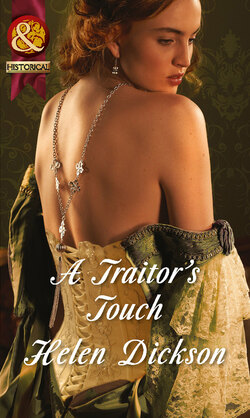Читать книгу A Traitor's Touch - Хелен Диксон, Хелен Диксон, Helen Dickson - Страница 8
ОглавлениеPrologue
1734
On the discovery of a plot for the capture of the royal family and the proclamation of King James across the water, Andrew Brody was arrested with other malcontents and hanged at Carlisle. His body was brought home to Glasgow in a plain wooden box. To spare his wife and young daughter the sight of his blue and grotesque face, its tongue bulging from a rictus mouth, the lid was kept nailed down.
Maria, his wife, went mad with grief. She wept day and night and could not eat. She was terribly ill and there was no consoling her.
After two weeks, their seven-year-old daughter, Henrietta, went outside to look for her mother, thinking she might have taken a turn round the garden. When she failed to locate her she turned to go back to the house, but for some reason she did not fully understand herself, stopped and looked towards the river. Following a moment of indecision, she began to walk towards it. Perhaps it was to satisfy a sense of nostalgia, to recall happier times when the river had been a magical place. Or perhaps it was some other, darker sense that impelled her to get a closer look.
Whatever it was it led her along the bank of the gently swirling river. And that was when she saw a woman’s body floating face down in the water, her hair forming a rippling halo on the surface.
It was her mother.
Henrietta’s stomach lurched and she called her mother’s name and drew closer to the edge, hoping she was not too late, but knowing that she was. She turned and ran back to the garden.
‘Help me!’ she cried to the gardener raking up leaves into a heap. ‘My mother—she’s in the river. I don’t know what to do! Help me! Please help me!’
The gardener threw down the rake and ran towards the river, the girl following close on his heels. On seeing the body, he quickly assessed the situation. Wading into the water, he hauled his mistress onto dry ground and rolled her on to her back. He stared down at the lifeless form, at the woman’s face that was so white, but still beautiful in death.
The gardener looked up at the child. She stood like a small frozen statue, her eyes wide and filled with horror, and he could feel the agony coming off her, sense the torment twisting her soul like a weighted rope. Slowly she got down on her knees, staring into her mother’s bloodless face, her small hand smoothing her dark brown hair back from her forehead over and over again, whispering words the gardener could not hear.
The girl was remembering all the days spent with her mother, how they would sing and gossip. How nothing could touch them then. But now she was gone. The vivacious, spirited and delightful woman was gone. The girl told herself over and over again she would not see her mother again in life. But now she must not think of it, else she would lose her mind like her mother.
Eventually the gardener rose on stiff legs. ‘It would seem your mother has had an accident, Miss Henrietta,’ he said by way of explanation, while knowing otherwise. ‘I will carry her to the house,’ he said gently. The child did not look up, did not break the rhythm of her hand stroking her mother’s hair as she whispered tenderly, as though they two were the only people left on God’s earth. ‘I will be gentle with her, I promise, but I think we should take her home now.’
The gardener waited a while longer, watching a swan with three cygnets in her wake sail stately by. Then the child got to her feet. Her face glistened with tears and bewilderment filled her green eyes as though she was desperate to understand why her mother had left her.
‘Please don’t hurt her.’
Swallowing hard with a resolute nod, for one heartbreaking moment, the gardener looked down into the young face. ‘I won’t.’ And so, carefully, more carefully than he had ever done anything in his life, he bent and took the dead woman into his arms, trying not to look at her face as he carried her to the house.
* * *
The funeral coming so soon after her father’s interment was too much for the child. She drew in a breath of panic. She did not want to be there. She did not want to be afraid all the time—afraid of death. Her father’s brother, Uncle Matthew, came and took her in his arms.
Matthew shook his head in despair. Tears lit his eyes. He tried to explain. All this had happened because her father was a Jacobite. Matthew was of the opinion that men should be free to worship God as they chose, as long as they obeyed their king and did no harm by it. Tragically his brother had supported the wrong kind. The Jacobite cause had been his life. Even when he was condemned he saw his last journey to the scaffold as a veritable moment of glory, as though he were raised suddenly to celebrate for his good deeds, instead of hanged for his seditious acts against the Crown.
The girl could not get beyond the Jacobite word. This new knowledge of the circumstances surrounding her father’s execution, followed so quickly by her mother’s suicide, haunted her day and night. The anger and hate directed at the Jacobites entwined, swelling and blooming inside her, threatening to consume her body and soul. It was anger and hatred more acute and darker than anything she had ever known.
And then Uncle Matthew took her away—to London—putting as much distance between her and the event as was possible.
